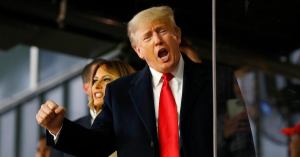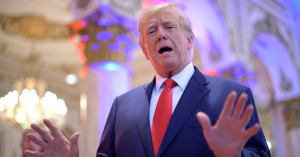Back in 2018, President Donald Trump claimed he could pardon himself as president. Now that he is about to enter the lame-duck period of his presidency, the question is back in the forefront. Can the president really pardon himself? Constitutional law scholars disputed Trump’s claim two years ago, and the answer is still uncertain. The presidential pardon is not absolute, and no president has ever tried to pardon himself before.
Trump’s comment about pardoning himself came on July 4, 2018. He claimed “numerous legal scholars” said he had the “absolute right” to pardon himself, although he still insisted he did “nothing wrong” in relation to special counsel Robert Mueller’s investigation. At the time, Trump and his lawyer, Rudy Giuliani, claimed Trump would not actually pardon himself, reports CNN.
Videos by PopCulture.com
While no president has tried to pardon himself, the Justice Department’s Office of Legal Counsel wrote a memo in 1974 on the issue, just days before President Richard M. Nixon resigned due to the Watergate scandal. In the three-page memo, the office wrote a president could not pardon himself because “no one may be a judge in his own case.” Nixon was pardoned by his successor, President Gerald Ford.
“When people ask me if a president can pardon himself, my answer is always, ‘Well, he can try,’” Brian Kalt, a constitutional law professor at Michigan State University, told Reuters. “The Constitution does not provide a clear answer on this.” Kalt agreed with the idea that the president trying to pardon himself would be unconstitutional since it would involve a person being their own judge in their own case. However, Kalt suggested Trump could preemptively pardon himself to cover future prosecutors. If that happened, then Trump was charged by a federal prosecutor, Trump could use the pardon as a defense, according to Kalt.
On its face, the presidential pardon seems like an absolute power with no checks. The president can issue a pardon for someone who has been prosecuted and can cover conduct that still has not faced criminal charges. The legislative or judicial branches cannot review the pardons, and the president does not need to explain the pardon decision. The president can also issue a commutation, which leaves a conviction in place but ends the punishment.
However, the pardon only covers federal crimes. If Trump could pardon himself (and his associates, which he can do), the pardons would not stop Manhattan District Attorney Cyrus Vance’s two-year investigation into the hush money payments Michael Cohen paid to two women just before the 2016 presidential election. The two women claimed they had sexual encounters with Trump, which he denies. New York Attorney General Letitia James is also investigating the Trump Organization.
Sources told CNN Trump has been asking his aides about pardoning himself since 2017. One former aide said Trump also asked about pardoning his family and issuing pardons pre-emptively. One former official said Trump will try to pardon himself “of course.” Others are not so sure, since doing so would imply Trump is guilty of wrongdoing.





